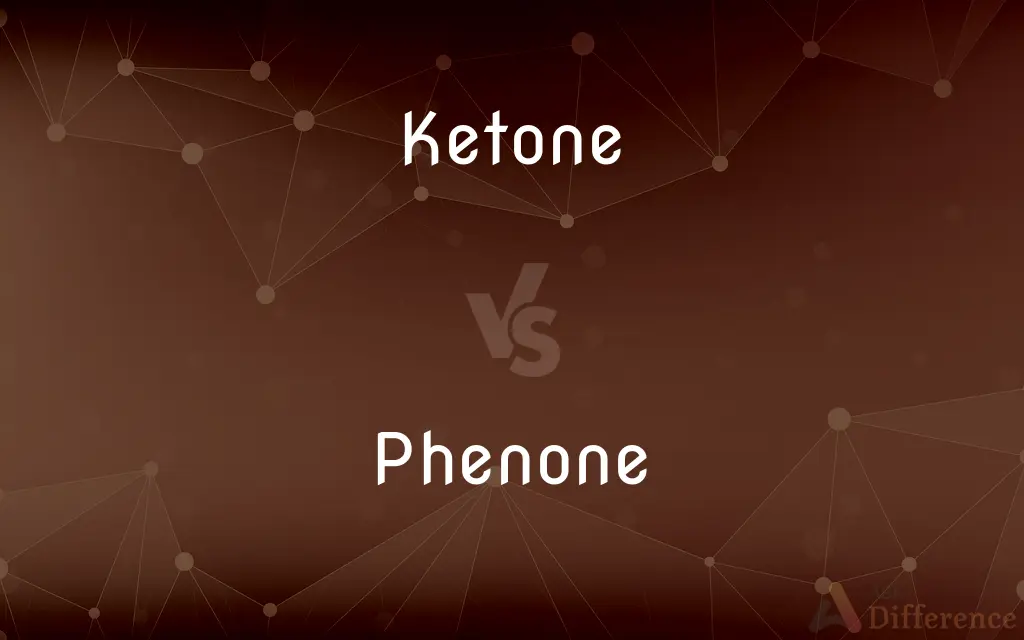Ketone vs. Phenone — What's the Difference?
By Fiza Rafique & Urooj Arif — Updated on March 14, 2024
Ketone is a functional group in organic chemistry, while phenone refers to ketones specifically within aromatic compounds.

Difference Between Ketone and Phenone
Table of Contents
ADVERTISEMENT
Key Differences
Ketones are organic compounds characterized by the presence of a carbonyl bonded to two carbon atoms. They are versatile in organic synthesis and found in various natural and synthetic substances. Phenones, on the other hand, are a subclass of ketones where the carbonyl group is directly attached to an aromatic ring, such as benzophenone. This aromatic attachment alters the compound's reactivity, making phenones particularly useful in the synthesis of fragrances, pharmaceuticals, and UV stabilizers.
Ketones can be simple, like acetone, or more complex, appearing in sugars, fragrances, and industrial chemicals. Their reactivity and polarity make them essential in organic chemistry, pharmaceuticals, and materials science. The aromatic nature of phenones affects their physical properties, such as boiling points and solubility, distinguishing them from aliphatic ketones.
While all phenones are ketones, not all ketones are phenones. The key difference lies in the structure and the presence of an aromatic ring in phenones. This structural distinction influences their chemical behavior, especially in reactions involving the carbonyl group. Phenones tend to undergo reactions that reflect the stability and electronic effects of the aromatic system, such as nucleophilic aromatic substitution, which is less common in non-aromatic ketones.
The applications of ketones and phenones vary widely, reflecting their diverse chemical properties. Ketones serve in solvent applications, perfumery, and as intermediates in the synthesis of more complex molecules. Phenones, with their aromatic character, find use in more specialized chemical applications and as intermediates in synthesizing high-value chemical products.
Despite their differences, both ketones and phenones play crucial roles in organic chemistry and industrial applications. Their study not only furthers understanding of chemical reactivity but also aids in the development of new materials, medicines, and technologies.
ADVERTISEMENT
Comparison Chart
Definition
Organic compounds with a carbonyl group between two carbon atoms.
Ketones with the carbonyl group attached to an aromatic ring.
Example
Acetone
Benzophenone
Reactivity
General reactions involve the carbonyl group.
Reactivity influenced by aromatic ring stability and electronic effects.
Applications
Solvents, perfumes, intermediates in synthesis.
Fragrances, pharmaceuticals, UV stabilizers.
Structural Requirement
Carbonyl group bonded to two carbon atoms.
Carbonyl group bonded to an aromatic ring.
Compare with Definitions
Ketone
Used in organic synthesis and as solvents.
Ketones like acetone are solvents for paints and plastics.
Phenone
Found in specialty chemicals and pharmaceuticals.
Certain phenones are precursors to fragrances and drugs.
Ketone
A compound with a carbonyl group between two carbon atoms.
Acetone is a simple, widely used ketone.
Phenone
Used in organic synthesis of high-value products.
Phenones are intermediates in synthesizing complex molecules.
Ketone
Can form complex structures in nature and synthetically.
Cortisone is a complex ketone with medical uses.
Phenone
A ketone with the carbonyl group attached to an aromatic ring.
Benzophenone is used in sunscreen for its UV protection.
Ketone
Common in biological compounds and synthetic materials.
Many sugars in their keto form are ketones.
Phenone
Exhibit unique reactivity due to aromatic stabilization.
Phenones can undergo nucleophilic aromatic substitution.
Ketone
Versatile in chemical reactions.
Ketones undergo reactions like oxidation and nucleophilic addition.
Phenone
Have distinctive physical properties.
Phenones often have higher boiling points due to aromaticity.
Ketone
In chemistry, a ketone is a functional group with the structure R2C=O, where R can be a variety of carbon-containing substituents. Ketones contain a carbonyl group (a carbon-oxygen double bond).
Phenone
Any aromatic ketone containing a phenyl group directly attached to the carbonyl group
Ketone
Any of a class of organic compounds, such as acetone, characterized by having a carbonyl group in which the carbon atom is bonded to two other hydrocarbon groups and having the general formula R(CO)R′, where R may be the same as R′.
Ketone
See ketone body.
Ketone
(organic compound) A homologous series of organic molecules whose functional group is an oxygen atom joined to a carbon atom—by a double bond—in a carbon-hydrogen based molecule.
Ketone
One of a large class of organic substances resembling the aldehydes, obtained by the distillation of certain salts of organic acids and consisting of carbonyl (CO) united with two hydrocarbon radicals. In general the ketones are colorless volatile liquids having a pungent ethereal odor.
Ketone
Any of a class of organic compounds having a carbonyl group linked to a carbon atom in each of two hydrocarbon radicals
Common Curiosities
How do the applications of ketones and phenones differ?
Ketones have broad applications including solvents and synthetics, while phenones are used in more specialized chemical productions like fragrances and pharmaceuticals.
What defines a ketone?
A ketone is defined by the presence of a carbonyl group bonded to two carbon atoms.
What makes phenones unique among ketones?
Phenones are unique due to their carbonyl group being attached to an aromatic ring, affecting their reactivity and applications.
Can all ketones be classified as phenones?
No, only those ketones with a carbonyl group attached to an aromatic ring are classified as phenones.
How does the presence of an aromatic ring in phenones affect their properties?
The aromatic ring in phenones affects their chemical reactivity, stability, and physical properties like boiling point and solubility.
Is benzophenone a type of ketone?
Yes, benzophenone is a type of ketone, specifically a phenone, because it has a carbonyl group attached to an aromatic ring.
What is the significance of the carbonyl group in ketones?
The carbonyl group in ketones is key to their reactivity, allowing for various chemical reactions important in organic synthesis.
Can phenones be used in medicinal chemistry?
Yes, phenones are used in the synthesis of various pharmaceuticals due to their unique chemical properties.
What role do ketones play in industry?
Ketones are used as solvents, in perfume manufacturing, and as intermediates in the synthesis of various chemicals.
Are there environmental considerations with the use of ketones?
Yes, some ketones, like acetone, have environmental and health considerations due to their volatility and potential toxicity.
Why are phenones important in organic synthesis?
Phenones are important due to their unique reactivity influenced by the aromatic ring, making them valuable intermediates in the synthesis of complex organic molecules.
Are ketones found in nature?
Yes, ketones are found in many natural substances, including sugars and certain hormones.
How do ketones interact with other chemicals?
Ketones can undergo a range of reactions, including nucleophilic addition and oxidation, depending on the surrounding chemical environment.
What is a simple test to identify ketones?
The Brady's test, involving the reaction of ketones with 2,4-dinitrophenylhydrazine to form a precipitate, can identify ketones.
How are phenones synthesized?
Phenones can be synthesized through Friedel-Crafts acylation, among other methods, involving the introduction of a carbonyl group into an aromatic ring.
Share Your Discovery

Previous Comparison
Seat vs. Sit
Next Comparison
Prison vs. PenitentiaryAuthor Spotlight
Written by
Fiza RafiqueFiza Rafique is a skilled content writer at AskDifference.com, where she meticulously refines and enhances written pieces. Drawing from her vast editorial expertise, Fiza ensures clarity, accuracy, and precision in every article. Passionate about language, she continually seeks to elevate the quality of content for readers worldwide.
Co-written by
Urooj ArifUrooj is a skilled content writer at Ask Difference, known for her exceptional ability to simplify complex topics into engaging and informative content. With a passion for research and a flair for clear, concise writing, she consistently delivers articles that resonate with our diverse audience.














































